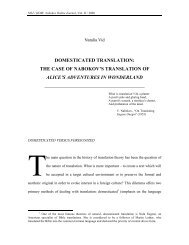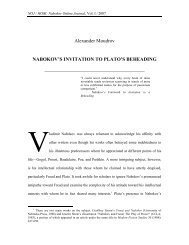Create successful ePaper yourself
Turn your PDF publications into a flip-book with our unique Google optimized e-Paper software.
Nabokov Online Journal, Vol. V (2011)<br />
_______________________________________________________________________<br />
postmodernist strategies, this paper will add the analysis of Pera’s novel as a postmodern<br />
critique of the modernist aestheticism that, it might be argued, Nabokov’s text espouses.<br />
Remarkably, Nabokov fils’s foreword, beyond expressing his aversion to the<br />
existence of Pera’s novel, serves another important function: it forces upon Pera his<br />
permission for publication, which in fact she had never requested. Nabokov thereby both<br />
rejects and adopts the dreaded Lo’s Diary, 5 contributing to the expansion of the<br />
intertextual space initiated by his father’s Lolita and engaged by Pera’s text. I will argue<br />
here Dmitri Nabokov’s initiation of a lawsuit against Pera’s book in reality constitutes a<br />
shrewd attempt on the plaintiff’s part to have the last word in Pera’s debate with Vladimir<br />
Nabokov’s Lolita on the ethical value of aesthetics. While ostensibly enforcing the<br />
containment of Lolita within the limits delineated by its author, the author’s son de facto<br />
facilitated an even further explosion of Nabokov’s themes and characters beyond the<br />
borders of the novel into extratextual space – the sort of spill-over Nabokov’s<br />
controversial book has tended to produce. I am interested in this paper not so much in<br />
Lolita itself, but its afterlife. While there may have been, arguably, more successful<br />
attempts at parodying Nabokov’s novel 6 , it is the author of Lo’s Diary that found herself<br />
in a peculiar debate with another reader of Lolita, the debate that had some “real-life”<br />
ramifications. It could be noted that Lolita has had other non-literary aftereffects, such as<br />
the proliferation of “Lolita”-themed pornography, or the incorrect attribution of this name<br />
to a hypothetical over-sexualized child seductress. But it is in the case of Nabokov v.<br />
Pera, I would argue, that the novel’s central aesthetic issues, the existence of bad taste<br />
5 This act of appropriation is further underscored by the novel’s convoluted copyright page, which lists the<br />
copyright holders of the Italian-language original, its English translation, and Vladimir Nabokov’s Lolita,<br />
informing the reader moreover that “[t]his edition of Lo’s Diary is published by arrangement with the<br />
Estate of Vladimir Nabokov.” The copyright page of the Russian edition of Pera's book (made from the<br />
English translation and in arrangement with the Nabokov Estate) is even more surprising, as it<br />
acknowledges Dmitri Nabokov’s foreword, while the volume itself strangely omits it. I am grateful to Yuri<br />
Leving for bringing this curiosity to my attention.<br />
6 The same year that Pera’s book was published in English saw the appearance of Emily Prager’s Roger<br />
Fishbite, a remarkably funny novel about a twelve-year-old girl’s relationship with her pedophilic<br />
stepfather told from the girl’s point of view. At the end of the text Prager states that her novel is a parody<br />
both of Lolita the book and Lolita the phenomenon. Less clearly parodic, but with some recognizable<br />
allusions to Lolita, is A. M. Holmes’s horrific The End of Alice.<br />
4

















